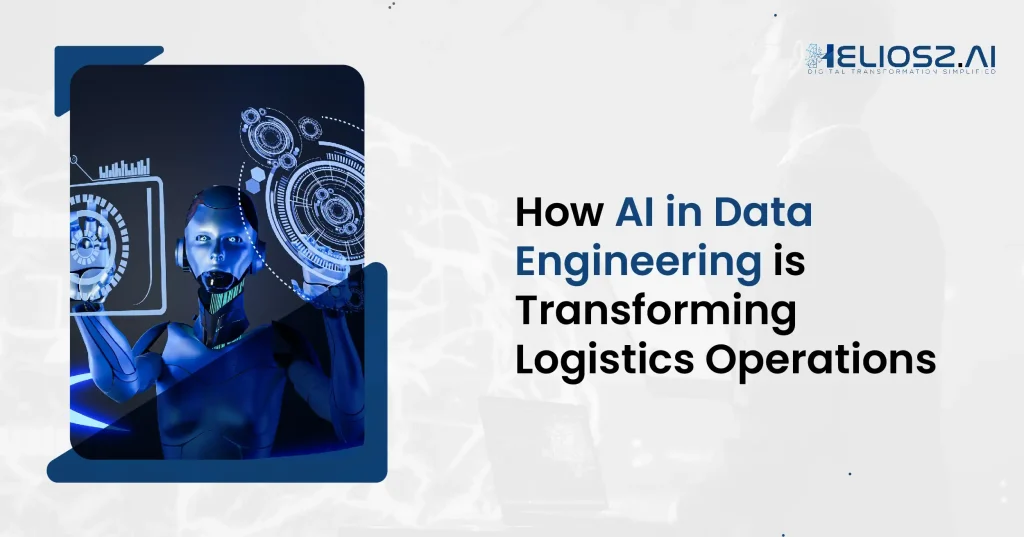
Data is the thread that is valued for linking all the different parts of the supply chain in logistics. In the process from inventory management to transportation organization, data-driven insights are crucial to ensure the smooth running of operations.
Nonetheless, the logistics data, with their vast volume and intricacy, have been traditionally too hard to deal with for classical data analysis. There comes artificial intelligence (AI), a disruptive technology that is changing the game for data science and the provision of logistic solutions.
This informative article will explain in detail how AI in data engineering can transform logistics operations.
Table of Contents
- Significance of Data Engineering in Modern Logistics
- 5 Key Roles of AI in Data Engineering for Effective Logistics Operations
- Advanced Data Integration and Harmonization
- Predictive Analytics and Demand Forecasting
- Automation of Routine Data Engineering Tasks
- Data Security and Anomaly Detection
- Real-Time Decision-Making and Optimization
- Impacts and Benefits of AI-Powered Data Engineering in Logistics
- Heliosz.AI for AI-Driven Data Engineering Solutions for Logistics Companies
- Bottomline
Significance of Data Engineering in Modern Logistics
Modern logistics are heavily based on data engineering and serve as the major efficiency source and the processing of strategies.
In a commodity market, where the retailer’s artifacts are in hand and to be delivered to the consumers, data engineering is a process to extract the raw data and put it to good use employing structured, actionable insights to make logistics operations go.
It entails the use of advanced features for data treatment, integration, and analysis, which facilitate supply chain visibility in real-time, enable demand forecasting through predictive analytics, and make route planning and inventory management more efficient.
This proficiency is not only for operational effectiveness but is also used for data-driven decision-making through reduced costs, service improvement, and the supply chain’s robustness.
Put simply, data engineering is the resource that enables logistics companies to steer through complexities, adjust to the arbitrary dynamism of the market, and keep a competitive advantage among data-driven businesses.
5 Key Roles of AI in Data Engineering for Effective Logistics Operations
Advanced-Data Integration and Harmonization
AI is making data integration easier and more efficient in the field of logistics by bringing together different data sources.
Data integration in the traditional way typically faces the challenge of the variety and volume of data that are generated from different systems, such as warehouse management systems, transportation management systems, and customer relationship management platforms.
Artificial Intelligence (or AI) data engineering refers to the use of machine learning algorithms that combine data smoothly from these different sources to form a single coherent dataset.
These algorithms have the capability of recognizing and dealing with contradictions, duplicate entries, and inconsistencies on their own, even as data is being collected, which would make sure that the collated information is accurate, reliable, and ready to be analyzed.
This unification of data is the key source of information for logistics managers who are responsible for decision-making, coordination, and efficient operation.
Predictive Analytics and Demand Forecasting
AI’s application in predictive analytics is highly transformational in logistics operations. AI models can predict future demand with great precision by studying past data, market trends, or outer factors such as economic indicators or weather patterns.
The logistics companies must forecast the change in demand so they can replace or store the right/much inventory at the right time, thus arranging road transportation in advance and ensuring the arrival of the goods at the right time.
AI-based predictive analytics can help minimize the costs associated with overstocking or stockouts, and also cut waste as well as improve customer satisfaction by meeting demand effectively. Also, these predictive models can be revised by including new data, thus a company can, in real-time, be more flexible and respond.
Automation of Routine Data Engineering Tasks
AI is at the forefront of automating everyday, simple runs in logistics and speeding complicated processes. AI reduces the necessity for manual intervention while processing and reporting of data collection are automated, which allows not only to speed up the operations but also to minimize the risk of human errors.
In the example, AI comes in to supervise the process of order tracking, keeping track of the inventory, and sending the shipment; this enables the logistics firms to perform better and not make as many errors.
Moreover, AI-driven process automation spreads to more challenging tasks, i.e., the automatic management of contracts and the dynamic pricing adjustments, which are the tasks for which real-time data analysis and decision-making are needed.
The capability of AI to function autonomously in these tasks allows humans a little bit of free time to think, therefore, they concentrate more on strategic activities such as the improvement of customer relationships or the search for new market opportunities, respectively, thus increasing the operational effectiveness of logistics.
Data Security and Anomaly Detection
AI-driven data utilities are equipped with the exactitude of abnormality-detecting algorithms that can analyze data streams for extraordinary patterns or actions that could be indicative of a security breach or a fault in the system.
The AI systems are the ones which are trained to detect all sorts of threats, no matter the existing ones and the new ones that they have never seen before, hence they are capable of proactively identifying and mitigating the risks and doing it even before the risks evolve into significant threats to the firms.
For example, if an unexpected data transmission is found to be a deviation from regular operations, the AI system can just send a security alert to security teams to probe, thereby data theft or unauthorized access can be prevented.
A strong security infrastructure is the only answer in logistics management, which is to create a strong bond with data, the most important asset of logistics operation.
Real-Time Decision-Making and Optimization
AI is the technology that makes use of the real-time activities of a logistics company by giving advanced decision support systems that can analyze vast amounts of data and offer the best solutions within seconds.
One of how this is done in route optimization is AI algorithms that can interpret current traffic conditions, fuel costs, vehicle capacities, and delivery schedules to give the best apparatus for fleet operations.
These AI applications are also able to change and adapt the course in emergencies, for example, traffic jams, or delays, thus making sure that the logistics remain on track and within budget.
However, the benefit of route optimization also extends to the management of the warehouse, where AI can, for example, decide how to store goods most economically, regulate the labor force, and even predict equipment failures.
Impacts and Benefits of AI-Powered Data Engineering in Logistics
Enhanced Operational Efficiency
With the help of algorithms, the system can evaluate huge data sets in a matter of seconds, recognizing the trends and optimizing the processes.
In turn, this new level of productivity eventually brings the time and resources spent on logistics management closer to zero, hence, companies can deal with more of the orders with the same or fewer resources.
It leads to a smoothly running process that does not get held off, costs less, and at the same time gives higher productivity to the overall system.
Cost Reduction
Data engineering that is powered by AI is responsible for achieving cost savings in logistics operations, which is very important.
By optimizing routes, reducing fuel consumption, and improving inventory management, AI not only helps but ultimately cuts down companies’ operational expenses.
Similarly, the automation of routine tasks, the deployment of AI bots, and the machine learning (ML) of recommendation systems such as chatbots powered by AI reduce human errors, which then reduces the need to pay for costly mistakes.
Scalability and Flexibility
AI-based data processing guarantees logistics businesses the necessary means for adaptation to the changing needs of the market.
With increasing data volumes and a company’s growth, AI systems can be easily set to process larger data sets and more complex operations. Also, AI’s flexibility enables logistics to change quickly according to market conditions, regulations, or customer tastes without having to reconfigure the system, which was once a crucial step.
Enhanced Customer Experience
Through the use of AI-fueled data engineering, direct customer satisfaction is enhanced. Speedier delivery, correct tracking as well as top-quality service constitute key features of customer service improvement.
For example, the system may offer special delivery options that may be more suitable or if the customer is likely to experience a delay, they may be alerted in advance. Customers who are happy with the services are those who most of the time will want to remain faithful, thus the fact that long-term business is achieved.
Innovation and Competitive Advantage
AI application in data engineering occurs through the integration of novelty in the transport system. As a result of artificial intelligence companies, such as those that are using AI to develop more sophisticated and faster services, optimize their already existing processes, and find where business models have been improved.
This uniqueness that comes along renders both less with the commodity of it and enables it to be a distinguishing factor among competitors. The pace at which AI is growing is rapid and it is high time that those who were the first presented the future of logistics through digital technologies.
AI-Enhanced Supply Chain Visibility
AI streamlines the consolidation of vast and diverse data sources in real-time, providing businesses with a comprehensive, up-to-the-minute view of their operations. This capability enables companies to detect disruptions instantly, allowing for swift, proactive responses that minimize potential impacts.
By enhancing the quality and timeliness of decision-making, AI significantly boosts supply chain agility, ensuring that organizations can adapt quickly to changes and maintain smooth, efficient operations.
Intelligent Inventory Management
AI enhances inventory management by continuously analyzing real-time sales data, market trends, and customer demand patterns to determine optimal stock levels.
By automating the reordering process, it ensures that inventory is restocked just in time, minimizing excess stock and avoiding shortages. This precision in inventory control reduces holding costs, minimizes waste, and frees up capital, ultimately leading to improved cash flow and cost efficiency for businesses.
AI-Driven Sustainability Initiatives
AI contributes to sustainability by optimizing transportation routes to reduce fuel consumption, minimizing waste through smart resource management, and enhancing environmental conservation efforts by monitoring ecosystems and predicting environmental changes.
Enhanced Human-Machine Collaboration
AI enhances logistics by automating routine tasks, freeing professionals to focus on strategic planning and problem-solving, which leads to increased operational efficiency across the supply chain.
Heliosz.AI for AI-Driven Data Engineering Solutions for Logistics Companies
Take your business to the next level with Heliosz.AI, the AI-driven data engineering leader in the industry. Our state-of-the-art solutions are built to help you get the most out of your supply chain, boost efficiency, and provide the insights you need in real-time to make better decisions.
Whether your goal is to simplify processes, cut down costs, or even improve customer satisfaction, Heliosz.AI has the technology and know-how to help you stand out in a competitive market. Don’t just adapt; instead, innovate.
Work with Heliosz.AI today so that your logistics business can maximize the use of AI. Contact us today and experience the miracle of the AI dimension.
Bottomline
AI-driven data engineering has been a great help in logistics, by exchanging high IT efficiency with the help of analytic capabilities, planning properly, and innovation happening constantly. The integration of AI technology is such that the logistics sector becomes more efficient by reducing costs, saving time, and improving customer satisfaction through advanced analytics, predictive modeling, and real-time insights.
These advantages, along with better supply chain visibility and risk management, represent the real movers and shakers in modern logistics. The exploitation of AI solutions in logistics will not just be a game but a way of life for companies that want to stay competitive in a data-driven world.


